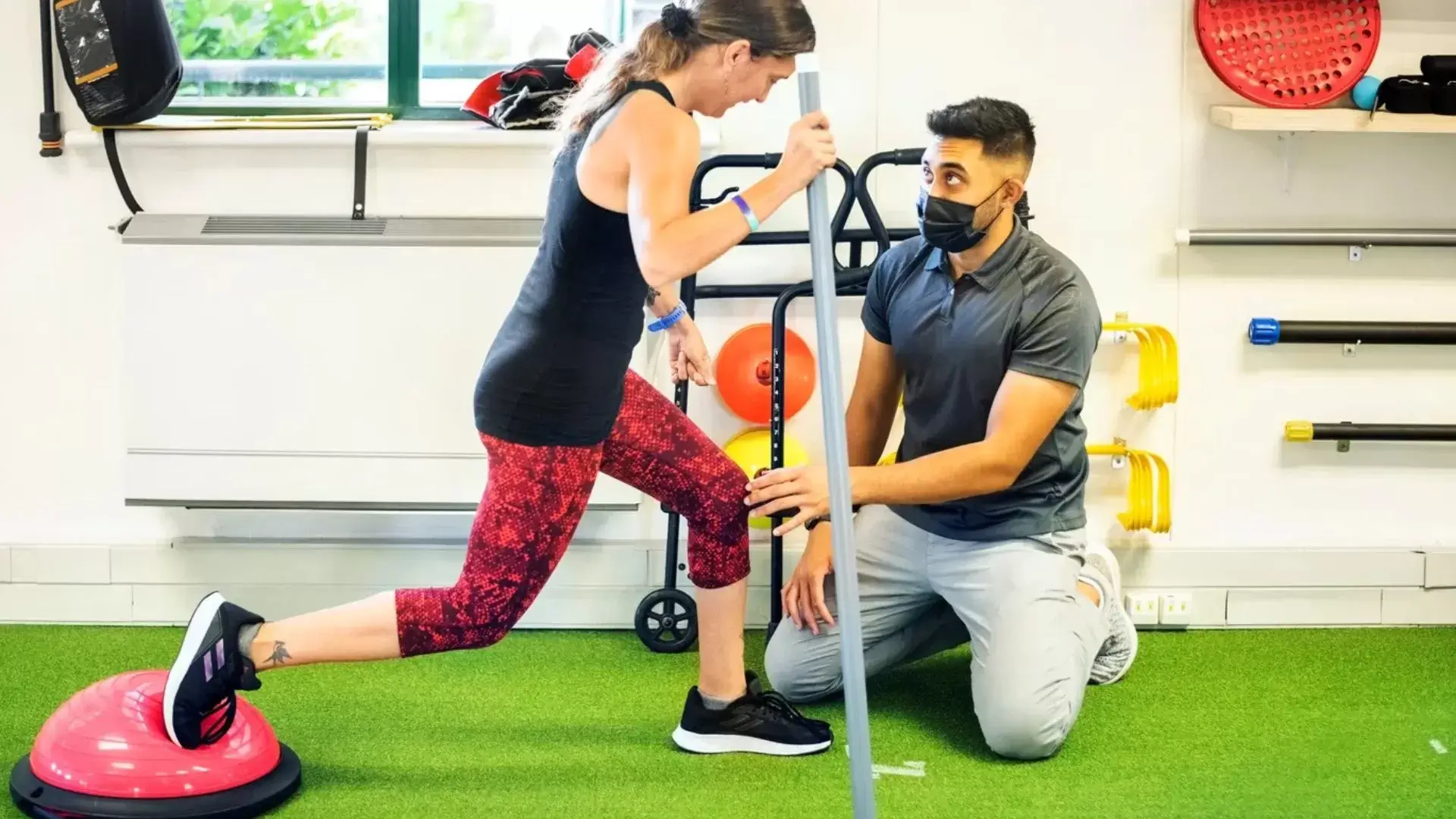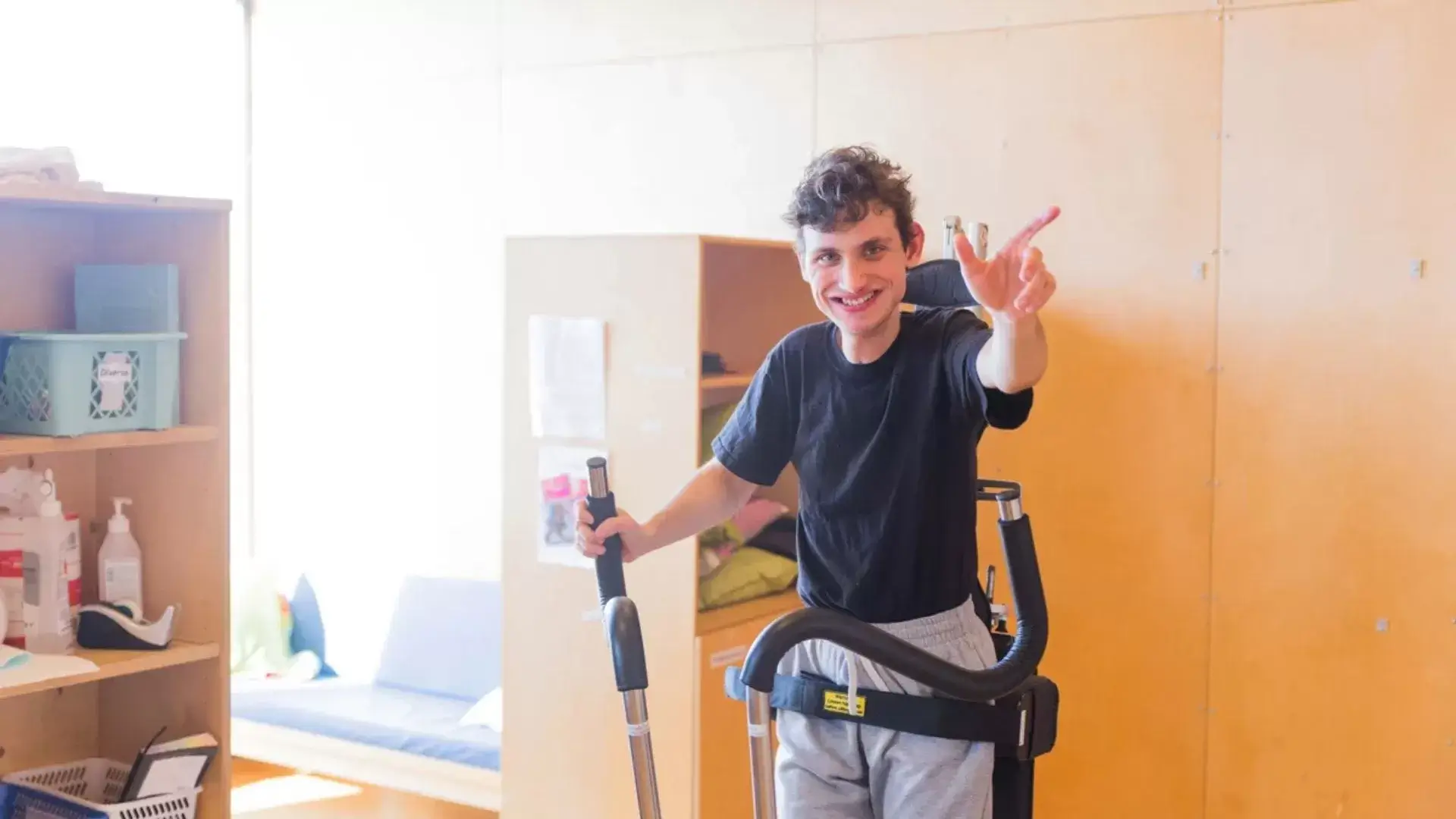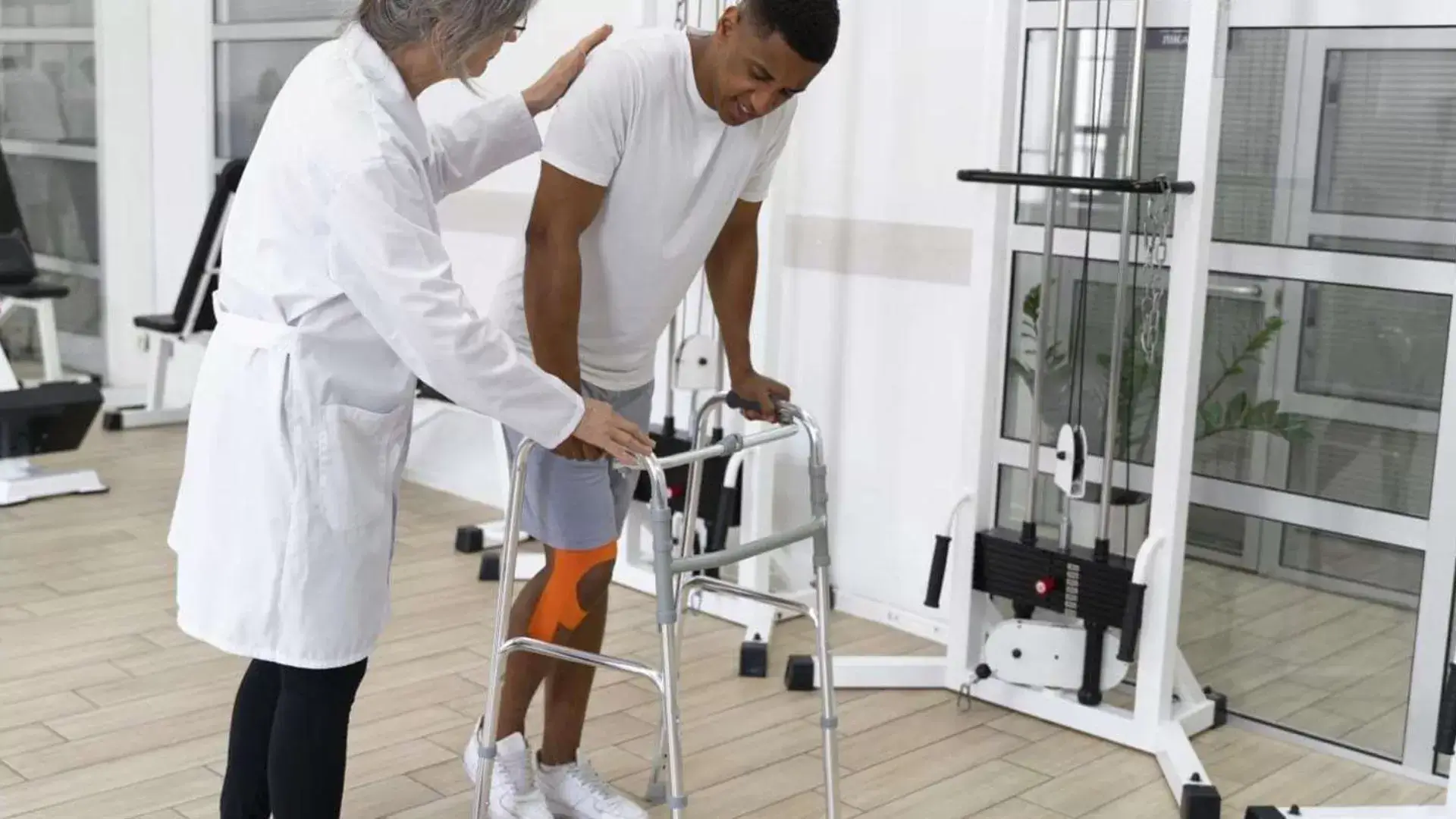At our Top Mississauga Physiotherapy & Chiropractic Clinic, we recognize how essential physiotherapy for cerebral palsy. We offer personalized treatment plans that focus on enhancing mobility and improving the quality of life. Our experienced team uses targeted techniques like strengthening exercises, gait training, and coordination improvements to manage movement challenges effectively. We also emphasize early intervention, involving families in the process to foster growth and consistency. Our holistic approach, integrating adaptive sports and assistive devices, empowers our clients to achieve their best potential. There’s so much more to explore about our thorough services and community support options.

At Mississauga Physio Chiro Clinic, we offer specialized physiotherapy and chiropractic services tailored to meet the unique needs of individuals with cerebral palsy. Our goal is to enhance motor function and improve overall quality of life. We recognize that muscle stiffness and spasticity can greatly impact daily activities, leading to coordination problems and impairments in both gross and fine motor skills.
Our thorough approach includes neurorehabilitation techniques designed to address these challenges through targeted exercises and manual therapies. We emphasize the importance of early intervention programs, which can greatly benefit children with cerebral palsy by promoting development and reducing complications over time.
In our sessions, we focus on improving mobility, strength, and flexibility while also providing education to families on managing symptoms effectively at home. Together, we work to create personalized treatment plans that evolve with each individual’s progress. Our compassionate team is dedicated to supporting families every step of the way, ensuring that everyone feels empowered in their journey toward improved motor function and independence. By combining physiotherapy and chiropractic services, we aim to foster a holistic healing environment that prioritizes the well-being of our clients.
Cerebral palsy, a group of neurological disorders affecting movement and coordination, arises from various causes and can manifest in different types, each with unique characteristics and risk factors. The primary cause of cerebral palsy is brain injury, often occurring during critical developmental stages. Prenatal infections, such as rubella, can lead to developmental delays and increase the risk of motor disabilities in affected children.
Perinatal brain injuries, including those caused by low birth weight or hypoxic-ischemic encephalopathy—where the brain is deprived of oxygen—are also significant contributors to the onset of this condition. Additionally, children with cerebral palsy may face additional challenges, such as epilepsy, which can complicate their overall health and development.
The types of cerebral palsy—spastic, dyskinetic, ataxic, and mixed—vary in symptoms and severity, affecting motor skills and coordination differently. Understanding these causes and risk factors is essential for us, as it allows us to provide empathetic care and tailored physiotherapy interventions. By recognizing the complexities of cerebral palsy, we can better support individuals and families steering this journey.
Movement challenges in individuals with cerebral palsy can vary considerably, often impacting their ability to perform everyday tasks and participate in social activities. These challenges arise due to a movement disorder resulting from prenatal brain damage or postnatal brain injury, affecting muscle control and coordination.
We observe that hypertonia, characterized by increased muscle tone, can lead to stiffness and difficulty in movement, while hypotonia, or decreased muscle tone, often results in muscle weakness, affecting posture and balance. This can create significant balance issues, making it hard for individuals to stay upright or navigate their environment safely.
Gait abnormalities are also common, with individuals exhibiting different walking patterns that can further complicate mobility. These challenges can affect not just physical activities but also social interactions, as individuals may struggle to engage fully in group settings.
In addressing these issues, physical therapy and occupational therapy play vital roles. They help individuals develop strategies to improve motor skills and enhance participation in daily life. Understanding these movement challenges allows us to tailor interventions that support individuals with cerebral palsy in achieving their personal goals.
Physiotherapy plays an essential role in helping individuals with cerebral palsy manage their symptoms and improve their overall quality of life. Through targeted interventions, we can enhance mobility, reduce muscle stiffness, and promote independence. Physiotherapy often incorporates the use of mobility aids, ensuring individuals can navigate their environments effectively.
For those experiencing dysarthria or other communication disorders, integrating speech therapy alongside physiotherapy can be beneficial. By addressing both physical and communicative challenges, we create a holistic approach to treatment.
In some cases, we may utilize muscle relaxants to alleviate discomfort, allowing for more effective participation in therapy sessions. Techniques such as functional electrical stimulation can also aid in muscle function and movement. Additionally, we encourage participation in adaptive sports, fostering physical activity and social interaction.
For some individuals, surgical options like selective dorsal rhizotomy may be considered in conjunction with physiotherapy to improve muscle control. Ultimately, our goal is to empower individuals with cerebral palsy by providing them with the tools and support they need to thrive, both physically and emotionally. Together, we can navigate this journey toward enhanced quality of life.

Incorporating targeted strengthening and stretching techniques can greatly enhance mobility for individuals facing the challenges of cerebral palsy. Through physiotherapy, we can develop a personalized approach that focuses on the specific needs of each person. Strengthening techniques help build muscle strength, which can improve stability and overall function. We often utilize resistance exercises tailored to individual abilities, ensuring that everyone can participate safely.
Stretching techniques are equally important, as they enhance flexibility and reduce muscle stiffness. By incorporating regular stretching into our routine, we can promote improved mobility, allowing for greater independence. For those using assistive devices, such as braces, walkers, or wheelchairs, these techniques can contribute to more effective use of these tools.
Furthermore, orthotics can be integrated into our strengthening and stretching programs, aligning with our goals for improved mobility. It is crucial to remember that each journey is unique; we’re here to support one another in building strength and flexibility. Together, we can create a thorough physiotherapy plan that empowers individuals with cerebral palsy to achieve their mobility goals, fostering a sense of achievement and confidence in everyday activities.
Achieving effective gait patterns is essential for enhancing mobility in individuals with cerebral palsy, and we can implement targeted strategies to support this important aspect of their physical development. Gait training is a vital component of physiotherapy that focuses on improving walking patterns, particularly for those experiencing abnormal muscle tone, dyskinesia, hemiplegia, or diplegia. By using specialized techniques, we can help individuals develop more efficient and coordinated movements.
In our sessions, we emphasize inclusive learning approaches, recognizing each person’s unique challenges and strengths. We utilize various tools, such as gait trainers and orthotic devices, to support their progress. Our strategies include repetitive practice and functional activities that mimic real-life walking scenarios, ensuring that individuals can transfer their skills to everyday situations.
Additionally, we incorporate feedback mechanisms to encourage self-awareness and improvement. This process not only enhances movement but also boosts confidence and independence. By fostering a supportive environment in our special education settings, we can empower individuals with cerebral palsy to achieve their mobility goals, ultimately improving their quality of life. Together, we can make a significant difference in their journey towards better mobility and functional independence.
Building on our focus on gait training, balance and coordination exercises play an important role in enhancing stability for individuals with cerebral palsy, helping them gain confidence in their movements and reduce the risk of falls. In our physiotherapy sessions, we incorporate various balance exercises designed to improve proprioception and the ability to maintain posture. These exercises help individuals develop better control over their voluntary movements, which is essential for daily activities.
Coordination exercises, such as reaching or transferring weight, further enhance motor skills and support rehabilitation efforts. By practicing these exercises regularly, we can greatly improve their overall stability. For those experiencing associated challenges, like dysphagia, we also guarantee that our approach is holistic, addressing multiple aspects of their well-being.
While advanced interventions, such as deep brain stimulation or botox injections, may be necessary for some, ongoing physiotherapy remains fundamental. It provides a foundation that complements these treatments, fostering independence in movement. Our goal is to empower individuals with cerebral palsy to navigate their environments safely and confidently through targeted balance and coordination exercises.
Assistive devices and orthotics play an essential role in enhancing mobility for individuals with cerebral palsy, offering the support needed to improve independence and everyday function. By integrating these tools into physiotherapy, we can address various conditions, including quadriplegia, paraplegia, and monoplegia, helping individuals navigate their environments more effectively.
Orthotics, such as braces and splints, help stabilize limbs affected by involuntary movements or weakness due to white matter damage. They assist in proper alignment and can reduce the risk of injury, allowing for greater participation in daily activities. On the other hand, assistive devices, including walkers and wheelchairs, facilitate increased mobility, enabling individuals to engage with their surroundings.
As we work together in physiotherapy sessions, we assess the specific needs of each individual. This personalized approach guarantees that the chosen devices align with their unique mobility challenges and goals. By utilizing assistive devices and orthotics, we not only enhance mobility but also promote confidence and self-reliance in individuals with cerebral palsy, empowering them to lead fulfilling lives. Ultimately, our collective efforts aim to create a supportive environment that fosters growth and independence.

Early intervention in physiotherapy for infants with cerebral palsy can greatly enhance their developmental outcomes and overall quality of life. By starting physiotherapy early, we can provide targeted treatment that focuses on improving motor skills and promoting functional independence. Evaluating each infant’s unique needs allows us to tailor our rehabilitation strategies, ensuring that we address their specific challenges.
Family involvement is essential during this process. We encourage parents and caregivers to participate actively in evaluations and treatment sessions, as their engagement fosters a supportive environment for the infant’s growth. Through collaborative efforts, we can create a consistent routine that reinforces the skills learned in therapy.
Our goal is to offer extensive developmental support that not only focuses on physical abilities but also nurtures emotional and social development. We utilize various techniques and exercises to enhance motor skills and coordination, helping infants achieve developmental milestones at their own pace.
In Mississauga, we’re committed to providing compassionate, evidence-based physiotherapy to infants with cerebral palsy, ultimately improving their quality of life and empowering families on this journey. Together, we can make a meaningful difference in the lives of these children.
Managing spasticity and reducing muscle tightness through targeted therapy is vital for improving mobility and overall function in children with cerebral palsy. Spasticity can greatly hinder motor skills, making it imperative for us to focus on effective management strategies. Through physiotherapy, we can implement tailored exercises that promote neurodevelopmental progress and enhance muscle coordination.
Our approach includes techniques such as stretching, strengthening exercises, and functional activities designed to alleviate muscle tightness. These methods not only improve flexibility but also facilitate better movement patterns, enabling children to engage more actively in their daily lives. We recognize the importance of creating a supportive environment that encourages participation, so we work closely with families to integrate therapy into everyday routines.
Additionally, ongoing rehabilitation can help us monitor spasticity levels and adjust therapy as needed. By fostering an open dialogue with caregivers, we guarantee that our strategies align with each child’s unique needs. Together, we can make considerable strides in managing spasticity and reducing muscle tightness, ultimately enhancing the quality of life for children affected by cerebral palsy. Our commitment to their rehabilitation journey empowers them to reach their fullest potential.
Postural therapy and core strengthening play an essential role in enhancing functional abilities for children with cerebral palsy, as they help stabilize the body and improve overall alignment. Through targeted physiotherapy, we can address the unique challenges faced by these children, such as intellectual disabilities, speech difficulties, and swallowing difficulties.
By focusing on postural therapy, we work to correct and optimize body alignment, which can lead to better function in daily activities. Strengthening the core muscles is equally important, as it provides a stable base for movement and enhances coordination. This approach not only aids in physical rehabilitation but can also reduce the risk of seizures and associated complications.
In our sessions, we incorporate exercises tailored to each child’s specific needs, ensuring that they build strength and stability at their own pace. The combination of postural therapy and core strengthening fosters greater independence, allowing children to engage more fully in their environments. As we continue this journey together, we remain committed to empowering our children to achieve their best potential, enhancing their quality of life through effective physiotherapy strategies.
Neurorehabilitation combined with Functional Electrical Stimulation (FES) offers significant benefits for children with cerebral palsy, enhancing muscle function and improving mobility through targeted interventions. By integrating these approaches into our physiotherapy sessions, we can address various challenges associated with cerebral palsy, including ataxia and dystonia, which often complicate motor function.
FES works by delivering small electrical impulses to stimulate muscles, promoting movement and strengthening. This technique is particularly effective for children who may have experienced brain malformation or neonatal stroke, as it helps to re-establish neural pathways. Through neurorehabilitation, we employ various rehabilitation techniques tailored to each child’s unique needs, allowing us to set achievable goals and track progress effectively.
We understand that every child’s journey with cerebral palsy is different, and that’s why we’re committed to creating a supportive environment. By combining FES with neurorehabilitation strategies, we can foster greater independence and improved quality of life for our young clients. Together, we empower children to overcome their challenges and maximize their potential, ensuring they can enjoy a brighter future.
In addressing speech and swallowing challenges in children with cerebral palsy, we utilize tailored physiotherapy approaches that focus on enhancing oral motor skills and facilitating effective communication. These challenges often arise from conditions such as brain hemorrhage, lack of oxygen at birth, or periventricular leukomalacia, which can impact the development of essential motor skills.
Our treatment approaches incorporate exercises that strengthen the muscles involved in speech and swallowing. We engage children in activities that promote coordination and control, which are crucial for effective communication. By using play-based methods, we can motivate children and make rehabilitation enjoyable, guaranteeing they remain engaged in their progress.
Additionally, we work closely with speech-language pathologists to create all-encompassing programs that address both speech and swallowing challenges. This collaborative approach guarantees that children receive holistic care that nurtures their growth and development. By focusing on individual needs, we aim to empower both the children and their families, fostering a supportive environment for achieving their communication goals. Through dedicated physiotherapy, we endeavor to enhance quality of life and promote independence in children with cerebral palsy.
Engaging in adaptive sports and recreational therapy offers children with cerebral palsy unique opportunities to enhance their physical abilities while fostering social skills and self-confidence. These programs are designed to promote active living through enjoyable physical activity, helping to improve motor skills and overall physical fitness.
Through adaptive sports, we can create an inclusive environment where children feel empowered to participate alongside their peers. This not only encourages community engagement but also provides valuable avenues for social interaction, allowing friendships to flourish. By integrating principles of physiotherapy, we can tailor activities to meet each child’s individual needs, ensuring they benefit fully from their experiences.
Recreational therapy plays a significant role in this process, offering various activities that stimulate both physical and emotional well-being. Whether it’s wheelchair basketball, adaptive swimming, or inclusive dance, these activities help children develop teamwork and communication skills in a supportive setting.
Ultimately, adaptive sports and recreational therapy not only promote physical health but also contribute to a sense of belonging and achievement. Together, we can champion a lifestyle that embraces inclusion and encourages children with cerebral palsy to thrive.
Building on the foundation of adaptive sports and recreational therapy, physiotherapy plays a pivotal role in enhancing daily life and promoting independence for children with cerebral palsy. Through targeted rehabilitation programs, we focus on improving mobility and motor skills, enabling children to navigate their environments more effectively.
Strength training is often a key component of our approach, helping to build muscle strength and endurance, which are essential for everyday activities. As we work together, we aim to empower children to perform tasks independently, whether it’s walking, playing, or participating in family activities.
Additionally, we recognize the importance of establishing robust support systems. By collaborating with families and caregivers, we can create an environment that fosters independence and encourages a higher quality of life. Our goal is not just to aid recovery, but to provide the tools and confidence needed for children to thrive.
Incorporating physiotherapy into daily routines can greatly impact children with cerebral palsy, helping them achieve their personal goals and embrace a more fulfilling life. Together, we can make a difference in their journeys toward independence and enhanced daily living.
Finding expert physiotherapy for cerebral palsy in Mississauga can greatly enhance the quality of life for children and their families. We recognize the challenges families face, and we’re committed to providing specialized care that focuses on each child’s unique needs. Through individualized treatment plans, we aim to improve motor skills and enhance mobility, allowing children to engage more fully in their daily activities.
Our expert physiotherapists utilize evidence-based techniques in physical therapy to foster rehabilitation and developmental support. We work closely with families to create a nurturing environment where children feel comfortable and motivated to progress. By setting realistic goals and regularly evaluating improvements, we can adapt our strategies to guarantee ongoing success.
The thorough approach we take not only targets physical abilities but also emphasizes emotional well-being. As we help children gain confidence in their movement, we see families transform together, celebrating each milestone achieved. In Mississauga, we’re dedicated to providing the highest standard of physiotherapy for cerebral palsy, guaranteeing that every child has the opportunity for a brighter, more active future. Let’s work together to create lasting changes that positively impact lives. Contact us now!
The City of Mississauga is a vibrant and diverse community that offers a range of resources and support services for families, making it an ideal place for those seeking specialized care for conditions like cerebral palsy. Located in Ontario, Mississauga provides an extensive network of healthcare services tailored to meet the needs of individuals with special needs.
In our community, we have access to various physiotherapy clinics that specialize in rehabilitation for children with cerebral palsy. These facilities not only focus on physical therapy but also integrate pediatric care, ensuring that our children receive holistic treatment. Additionally, we can benefit from community resources that offer support programs designed specifically for families traversing the challenges associated with cerebral palsy.

When we look at the qualifications of physiotherapists treating cerebral palsy, we find that they typically hold a degree in physiotherapy and are licensed to practice. Many also pursue specialized training in pediatric care and neurological conditions. Their education equips them with the skills to assess and create individualized treatment plans. We appreciate their commitment to ongoing professional development, ensuring they stay updated with the latest techniques and research in the field.
When it comes to physiotherapy treatment duration for cerebral palsy, it typically varies based on individual needs. We’ve seen that sessions might last from several weeks to several months, depending on the severity of the condition and the specific goals set. It’s important for us to remember that consistency is key, and regular assessments help us adapt the treatment plan to guarantee ideal progress and overall well-being for each person we work with.
When considering the side effects of physiotherapy, we should remember that most individuals experience minimal to no adverse effects. Occasionally, some may feel temporary soreness or fatigue after sessions as their bodies adjust to new exercises. However, these feelings typically subside quickly. It’s essential for us to communicate openly with our therapists about any discomfort we experience, ensuring that our treatment remains safe, effective, and tailored to our individual needs.
Absolutely, we can combine physiotherapy with other therapies for enhanced outcomes. Integrating occupational therapy, speech therapy, or even behavioral interventions often provides a more holistic approach to treatment. This combination allows us to address multiple aspects of an individual’s needs, fostering better progress and overall well-being. By collaborating with a multidisciplinary team, we can tailor our strategies, ensuring each person receives the thorough support they deserve for ideal development and recovery.
When considering the cost of physiotherapy sessions, we should expect prices to vary based on factors such as location, the therapist’s experience, and the type of treatment provided. Typically, sessions can range from $75 to $150 per hour. It’s important for us to consult with different clinics to find options that fit our budget while ensuring we receive quality care. Many facilities offer packages or sliding scale fees, which can help manage costs effectively.
Reach out to us today to book an appointment or learn more about our services. Our friendly team is here to answer your questions and help you take the first step toward improved health and wellness.
(647) 372-1209

At our Mississauga Physio Chiro Clinic, we are dedicated to providing personalized care that addresses the root cause of your discomfort. With a team of experienced physiotherapists and chiropractors, we focus on restoring your mobility, relieving pain, and enhancing your overall well-being.